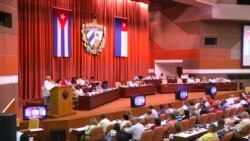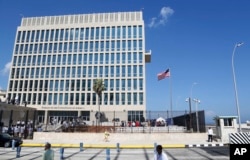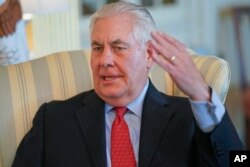Under pressure from U.S. lawmakers, the U.S. State Department said Tuesday Secretary of State Rex Tillerson will convene an accountability review board to probe the health attacks on 24 American diplomatic personnel in Cuba.
Todd Brown, diplomatic security assistant director for international programs in the State Department, told a Senate Foreign Relations Committee hearing that officials are investigating various potential causes for the attacks.
“I think there’s viral. There’s ultrasound. There’s a range of things the technical experts are looking at," Brown said.
He acknowledged the State Department has not been able to find out who is responsible for the attacks or what methods were used, and said the FBI took up the investigation in May.
“An FBI team has since visited Havana several times and met with Cuban officials. The FBI’s investigation has interviewed victims and conducted surveys of the residences and hotel rooms. However the investigation remains ongoing and we would refer all specific questions concerning the investigation to the FBI," Brown said.
Dr. Charles Rosenfarb, medical director in the State Department's Bureau of Medical Services said the symptoms most closely match those associated with a mild traumatic brain injury.
"Although the assembled group identified that some of the symptoms at finding could be caused by other things such as viral illnesses, previous head trauma, aging, and even stress, the consensus was that the patterns of injuries that had so far been noted were most likely related to trauma from a non-natural source," Rosenfarb told lawmakers.
‘Targeted attacks’
During Tuesday's hearing, senators from both parties slammed State Department officials for what they called a "sluggish" and inadequate response to what Tillerson says are "targeted attacks."
"This was not something conducted by a fly-by-night operation," Senator Marco Rubio, a Cuban-American Republican, told the Senate Foreign Relations Committee. "Whatever happened to these people happened as a result of some sophisticated technology that quite frankly is so sophisticated that we don't understand it."
Rubio listed the medically confirmed symptoms all 24 Americans have experienced: "sharp ear pain, dull headaches, ringing in one ear, vertigo, visual focusing issues, disorientation, nausea and extreme fatigue."
He said the incidents began as early as November 2016, with additional incidents last year.
Fellow Cuban-American senator and ranking Democrat Bob Menendez also said he was outraged by the attacks and dissatisfied with the State Department’s response.
“It is unfortunate that since the news of these bizarre and vicious attacks broke late last summer, we have not seen more public outcry against the Cuban government," Menendez said.
Acting Assistant Secretary of State for Western Hemisphere Affairs Francisco Palmieri defended his department’s response during Tuesday's hearing, saying the health and well-being of the 24 confirmed victims continues to be Secretary Tillerson’s and the department’s top priority.
Under questioning from Senator Rubio about the law requiring the State Department to convene an accountability review board whenever U.S. diplomatic personnel suffer serious injury at their posts abroad, he said that Tillerson will convene a review board and will officially inform Congress of his intentions soon.
‘Perplexing’
Cuba has denied any involvement, conducted its own investigation, and allowed State Department and FBI officials to travel to Cuba to conduct their own probe into what U.S. officials still describe as “perplexing” attacks.
Following the incidents, the United States recalled a number of non-essential diplomats and their families from Cuba and expelled 15 Cubans from the Cuban embassy in Washington.
Senator Menendez said expelling a handful of diplomats was hardly a bold move, and that the State Department’s response has been bureaucratic and troubling, noting the department had not even warned U.S. diplomats heading to Cuba about risks to their health and safety.
He said the Castro regime has proved time and time again it is not a responsible actor in the community of nations and that is has no regard for individual human rights.
“The Cuban government may or may not, at the end of the day, be responsible for attacking our diplomats. But as someone who has personally witnessed the modus operandi of the Cuban government, it is unfathomable that the Castro regime and the intelligence services specifically were not aware of these attacks," Menendez said.
In an interview with the Associated Press released Monday, Secretary of State Tillerson said he has no intention of restoring the normal U.S. diplomatic presence in Cuba, saying he would be “putting people intentionally in harm’s way” if he sent diplomats back to Cuba.







